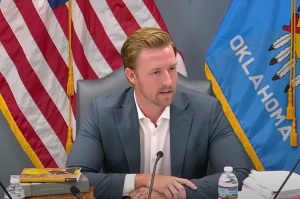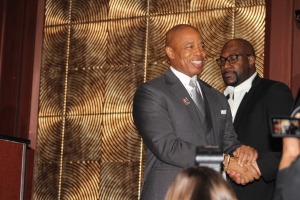Pro-Gay Groups Dispute Study Revealing That Kids Fare Worse in Same-Sex Households
A new study analyzing how children who grew up in same-sex parent households have fared as adults is being disputed by some pro-gay groups as questionable, while pro-family groups say it reveals what they have known all along -- children tend to fare best when raised in heterosexual households.
The New Family Structures Study, overseen by Mark Regnerus, an associate professor of sociology at The University of Texas at Austin, surveyed 3,000 U.S. adults from ages 18 to 39 and was published in the July issue of Social Science Research journal. Of the respondents, 73 shared that their father had engaged in a same-sex relationship and 163 reported that their mother had done the same. The research organization also concluded that based on their findings, differences have been observed between outcomes of children in same-sex-based intact families and children in cohabiting, divorced, step-, and single-parent families in the large, representative sample.
"Children who grow up in a household with only one biological parent are worse off, on average, than children who grow up in a household with both of their biological parents…regardless of whether the resident parent remarries," the study notes.
The study also adds that differences have recurred between children from same-sex couples and children from heterosexual couples in connection with factors such as health, mortality, suicide risks, drug and alcohol abuse, criminality and incarceration and intergenerational poverty, among others.
"This is by far the best study done on these issues because it is the first national sample survey that we have," said Patrick F. Fagan, Senior Fellow and Director of the Marriage and Religion Research Institute (MARRI), in a phone interview Monday with The Christian Post.
"It should get wide consideration, and the facts that it is revealing are substantive. To me, the most telling thing is how few, how minuscule the incidents of two homosexual parents raising children together are. It's 0.2 percent of the population," he added. "That is actually the biggest finding there. The other thing that is really clear is that instability seems to be the main component of gay coupling. That is one of the biggest findings that the gay community has to deal with."
Some pro-gay rights organizations have questioned the legitimacy of the results, saying that the 18-39 demographic covers children who have grown up in a time when same-sex couples have not been accepted in society, and kids in those households have had a harder time growing up because of that.
"I'd be interested in seeing this study redone in 20 years with the more intact same-sex families we see now," said Dr. Jenna Saul, a Wisconsin-based child and adolescent psychiatrist, ABC News reported. "This study doesn't really have anything to do with same-sex families of today."
Regnerus agreed that a study on younger children in same-sex households might reveal different results, but insisted that the study was not aimed at categorizing gays and lesbians as "bad parents."
"This study may not reflect the experience of younger children growing up today in same-sex families, particularly because society has become more accepting of gay and lesbian families in the last decade," he said in a University of Texas report. "Nor does the study tell us that same-sex parents are necessarily bad parents. Rather, family forms that are associated with instability or nonbiological parents tend to pose risks for children as they age into adulthood."
Fagan of the Marriage and Religion Research Institute told CP that suggestions that children today from same-sex households will be better off 20 years from now is merely a hope.
"I can understand their hope, but it is only hope. It has no basis in research. The analogous situation that I think one would look at, is what is happening intergenerationaly? To children of single parents?" he suggested.
"The scores on that are that gradually, we have some evidence from the National Longitudinal Survey of Youth, that the children of broken families, where 50 years that was much more frowned on and less accepted – the stigma on single-parent families is now lifted. But the scores have not changed – if anything they continue to prop intergenerationaly."
Fagan alluded to a 2002 National Longitudinal Survey by the U.S. Department of Labor that found that 7.8 percent of children in married-couple families were living in poverty, compared to 38.4 percent of children in female-householder families.
"That is not proof, but it raises the strong hypothesis that the wishful thinking will not be fulfilled," Fagan continued.
On suggestions that the study shows a strong anti-gay stance, Fagan explained that groups with a specific agenda will always find such studies suspicious – but that should not discredit the research.
"There is not a pro-gay or anti-gay good social science research. There is only good social science research. Good social science always upsets people with an agenda – I don't care if they are on the right or if they are on the left. Good social science describes human nature, which is often messy, the way it is."
Maggie Gallagher, co-founder of the National Organization for Marriage, agreed that the study is not a reflection on the parenting skills of gays and lesbians, but actually reveals what is best for children.
"Does this prove that gay parents are bad parents? No, of course not. It does suggest what no one familiar with the larger family structure research should be surprised by: compared to every other family form we know that has been studied, the 'gold standard' for children remains the intact, married biological family, a mom and a dad," she said in a statement.
John Corvino, professor of philosophy at Wayne State University, with whom Gallagher authored the book Debating Same-Sex Marriage, argued against suggestions that the NFSS study affects the same-sex marriage debate.
"Same-sex marriage never takes children away from competent biological parents who want them -- and thus, whatever insight the NFSS provides, it will not significantly inform, much less settle, the marriage debate," Corvino said in a statement.
"Unfortunately, that fact will not prevent its misuse by same-sex marriage opponents. What the study may do is provide data on the needs and challenges of children in same-sex households, only a minority of whom, sadly, currently have access to the stability of legal marriage."
Despite the debate, the study's author said its findings were not being provided as political fodder.
The findings are "consistent with a large body of research that suggests that children are most likely to thrive when they are raised by their own married parents," Regnerus said. "Such families provide a biological link between parents and children, and unparalleled levels of stability, both of which have a long reach in the benefits they afford to children."





























